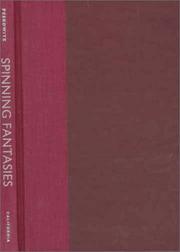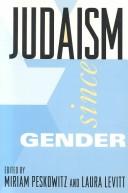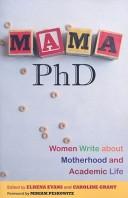| Listing 1 - 7 of 7 |
Sort by
|

ISBN: 0520919491 0585130914 9780520919495 9780585130910 9780520209671 0520209672 0520208315 0520209672 Year: 1997 Publisher: Berkeley, California : University of California Press,
Abstract | Keywords | Export | Availability | Bookmark
 Loading...
Loading...Choose an application
- Reference Manager
- EndNote
- RefWorks (Direct export to RefWorks)
Miriam Peskowitz offers a dramatic revision to our understanding of early rabbinic Judaism. Using a wide range of sources--archaeology, legal texts, grave goods, technology, art, and writings in Hebrew, Aramaic, Greek, and Latin--she challenges traditional assumptions regarding Judaism's historical development. Following the destruction of the Jerusalem Temple by Roman armies in 70 C.E., new incarnations of Judaism emerged. Of these, rabbinic Judaism was the most successful, becoming the classical form of the religion. Through ancient stories involving Jewish spinners and weavers, Peskowitz re-examines this critical moment in Jewish history and presents a feminist interpretation in which gender takes center stage. She shows how notions of female and male were developed by the rabbis of Roman Palestine and why the distinctions were so important in the formation of their religious and legal tradition. Rabbinic attention to women, men, sexuality, and gender took place within the "ordinary tedium of everyday life, in acts that were both familiar and mundane." While spinners and weavers performed what seemed like ordinary tasks, their craft was in fact symbolic of larger gender and sexual issues, which Peskowitz deftly explicates. Her study of ancient spinning and her abundant source material will set new standards in the fields of gender studies, Jewish studies, and cultural studies.
Sex in rabbinical literature --- Women in rabbinical literature --- Textile crafts in rabbinical literature --- Rabbinical literature --- Sex role --- Judaism --- Religion --- Philosophy & Religion --- Gender role --- Sex (Psychology) --- Sex differences (Psychology) --- Social role --- Gender expression --- Sexism --- Hebrew literature --- Jewish literature --- Women in the Talmud --- History and criticism --- Religious aspects --- Gender roles --- Gendered role --- Gendered roles --- Role, Gender --- Role, Gendered --- Role, Sex --- Roles, Gender --- Roles, Gendered --- Roles, Sex --- Sex roles --- Sex in rabbinical literature. --- Textile crafts in rabbinical literature. --- Women in rabbinical literature. --- History and criticism. --- Judaism. --- challenges traditional assumptions. --- classic form of religion. --- critical moment in jewish history. --- destruction of jerusalem temple. --- feminist interpretation. --- judaisms historical development. --- new incarnations of judaism. --- rabbinic judaism. --- rabbis of roman palestine. --- study of ancient spinning. --- understanding of early rabbinic judaism.
Book
ISBN: 1524713910 Year: 2019 Publisher: New York : Alfred A. Knopf,
Abstract | Keywords | Export | Availability | Bookmark
 Loading...
Loading...Choose an application
- Reference Manager
- EndNote
- RefWorks (Direct export to RefWorks)
Article
Abstract | Keywords | Export | Availability | Bookmark
 Loading...
Loading...Choose an application
- Reference Manager
- EndNote
- RefWorks (Direct export to RefWorks)

ISBN: 0415914612 Year: 1997 Publisher: New York Routledge
Abstract | Keywords | Export | Availability | Bookmark
 Loading...
Loading...Choose an application
- Reference Manager
- EndNote
- RefWorks (Direct export to RefWorks)
Feminism --- -Women in Judaism --- 396.7 --- 296 --- Judaism --- Emancipation of women --- Feminist movement --- Women --- Women's lib --- Women's liberation --- Women's liberation movement --- Women's movement --- Social movements --- Anti-feminism --- Religious aspects --- -Judaism --- Vrouw en religie --- Judaisme --- Emancipation --- Women in Judaism. --- Judaism. --- 396.7 Vrouw en religie --- History --- Criminology. Victimology --- Sociology of culture --- Developmental psychology --- Jewish religion --- Sociology of the family. Sociology of sexuality --- Philosophy --- anno 1940-1949 --- Women in Judaism --- Religious aspects&delete& --- Jewish feminism --- Race --- Gender --- Identity --- Victims --- Book --- Concentration camps
Book
ISBN: 9789022323083 Year: 2008 Publisher: [Place of publication unknown] De Harmonie
Abstract | Keywords | Export | Availability | Bookmark
 Loading...
Loading...Choose an application
- Reference Manager
- EndNote
- RefWorks (Direct export to RefWorks)
Vogels kijken, touwtje springen, eerste hulp bij ongevallen, knopen leggen, wiskundige trucs, een klok op citroenbatterijen laten werken, Griekse en Latijnse stamwoorden, een gereedschapskist aanleggen, fluiten op twee vingers…je vindt het allemaal in dit meisjesboek in onvervalste retro stijl. Tussen de praktische tips door doe je ook nog wat kennis op over verstandige, handige, avontuurlijke en machtige vrouwen uit de geschiedenisboeken.
Science --- Schurman, van, Anna Maria --- Frank, Anne --- Joan of Arc --- Jacobs, Aletta --- Boudicca [Queen of Iceni] --- Zenobia, Septimia [Queen of Palmyra] --- Salome, Alexandra --- Cleopatra VII --- Zuylen, van, Belle --- Girls --- Life skills guides --- Juvenile literature --- Guide --- Children's book --- Book
Book
ISBN: 9789061698609 Year: 2008 Publisher: Amsterdam : De Harmonie,
Abstract | Keywords | Export | Availability | Bookmark
 Loading...
Loading...Choose an application
- Reference Manager
- EndNote
- RefWorks (Direct export to RefWorks)


ISBN: 1281776580 9786611776589 081354498X 9780813544984 9781281776587 6611776583 9780813543178 0813543177 9780813543185 0813543185 Year: 2008 Publisher: New Brunswick, NJ
Abstract | Keywords | Export | Availability | Bookmark
 Loading...
Loading...Choose an application
- Reference Manager
- EndNote
- RefWorks (Direct export to RefWorks)
Every year, American universities publish glowing reports stating their commitment to diversity, often showing statistics of female hires as proof of success. Yet, although women make up increasing numbers of graduate students, graduate degree recipients, and even new hires, academic life remains overwhelming a man's world. The reality that the statistics fail to highlight is that the presence of women, specifically those with children, in the ranks of tenured faculty has not increased in a generation. Further, those women who do achieve tenure track placement tend to report slow advancement, income disparity, and lack of job satisfaction compared to their male colleagues. Amid these disadvantages, what is a Mama, PhD to do? This literary anthology brings together a selection of deeply felt personal narratives by smart, interesting women who explore the continued inequality of the sexes in higher education and suggest changes that could make universities more family-friendly workplaces. The contributors hail from a wide array of disciplines and bring with them a variety of perspectives, including those of single and adoptive parents. They address topics that range from the level of policy to practical day-to-day concerns, including caring for a child with special needs, breastfeeding on campus, negotiating viable maternity and family leave policies, job-sharing and telecommuting options, and fitting into desk/chair combinations while eight months pregnant. Candid, provocative, and sometimes with a wry sense of humor, the thirty-five essays in this anthology speak to and offer support for any woman attempting to combine work and family, as well as anyone who is interested in improving the university's ability to live up to its reputation to be among the most progressive of American institutions.
Motherhood --- Women in higher education --- Maternity --- Mothers --- Parenthood --- Education, Higher --- Social conditions.
| Listing 1 - 7 of 7 |
Sort by
|

 Search
Search Feedback
Feedback About UniCat
About UniCat  Help
Help News
News